#western visualization of queer relationships
Note
I don't know if you've written about it already, and if so you can just redirect me if you'd like, but there's obviously a lot of gay undertones to Naruto and Sasuke's relationship, and all the suggestive illustrations. How much of it do you think was consciously intentional by Kishimoto?
I'm sorry but what "clear undertones" are you referring to? Why does the friendship between two males have to be represented in a particular (usually Westernized) way so that it's not confused with romantic interest? It's prototyping homosexual romantic relationships so that they are labeled within a standard that the reader identifies them with.
It's perfectly fine to ship SNS if that's the desire of those who consume the manga, but to justify that choice on the premise that "Kishimoto planned it because there are clear indications of what I consider a homosexual romantic relationship to be" is dangerous (encapsulating homosexual relationships inside one specific dynamic diminishes the relevance of romantic LGTB+ bonds that do not develop on the same premise), and fetishizes same-gender relationships.
Kishimoto wrote similarly premised relationships throughout the manga, highlighting the relevance of having a "rivalry" between two people within shinobi culture, in that sense, Sasuke and Naruto are no different from other characters.
At the same time, this idea of a "romance clearly planned by the author" usually also hides the shipper's ideology that romantic love is intrinsically superior to any other kind, nullifying the relevance of other bonds that do not fall into this category. Sasuke is constantly relying on his love for his family to carry on throughout the manga, yet that bond is diminished by many SNS fans in order to give more relevance to his bond with Naruto. His friendship with the main character is also of incredible importance, yet somehow Sasuke considering Naruto his best friend isn't as relevant as him seeing him as a romantic partner, as that kind of bond is, to them, superior.
There is a huge market for queer products to enjoy within Japanese media and that is a much better place to explore such dynamics, as they are specifically designed to address such a demand. Seeking queer representation within products aimed at a largely cis-male, heteronormative audience encapsulates LGBT+ relationships under toxic and/or heteronormative codes and behaviors by stripping them of their self-identity and fetishizing their interactions in the process (here).
Furthermore, I've seen people questioning Kishimoto's own sexuality because "he's clearly a closeted gay as he wrote SNS" which destroys their whole stance as "LGTB+ supporters" because not only did they decide to publicly question the sexuality and "out" an author based on his fictional work, but also decided to lock same-gender relationships into a single dynamism, where the idea of "romance" is encapsulated in a largely antagonistic relationship with obsessive undertones. We call that "toxic" when it's a heterosexual relationship, so why wouldn't it be for a homosexual couple?
What exactly is different about that dynamic that allows an LGBT+ couple to explore the kind of bond that we consider toxic and unbalanced within a heterosexual relationship? Usually, many of these issues fall back on an internalized misogyny where, because women are usually inferior both physically and mentally to men, they cannot develop this kind of union in the same way that men can.
The relationship remains equally toxic and dangerous for both parties, but because they now don't find a concrete visualization of this imbalance (because, again, they perceive women as inherently inferior to men), they do not regard it in this way.
As I've said, shipping SNS it's alright, I personally can't see any romantic dynamic to get behind in the manga (which is, again, a personal preference of mine as I don't think Kishimoto cared much for those types of bonds), finding queer subtext in media is a common practice and was born out of the need for representation of a minority within a highly repressive society; but to see it as the only valid reading of a product and justify the lack of canonization of the couple under the premise of "social homophobia" within a community that the shipper usually does not know anything about (such as Japan) is a dangerous and senseless practice. Even more so considering the well-known and mainstream Japanese Yaoi market that exists and could use more support.
I'm sorry, I don't want to be rude to you in any manner, but your ask allowed me to explore a difficult and important topic that I tried to address very carefully because I think that people got completely desensitized with and, in their attempt to become a "supporter", they fetishized LGTB+ relationships.
#anti sns#anti sasunarusasu#anti sns fandom#anti shipping#western visualization of queer relationships#feminism#misoginy#lgbtq
44 notes
·
View notes
Text
I have thoughts about the Tiktok JK deleted
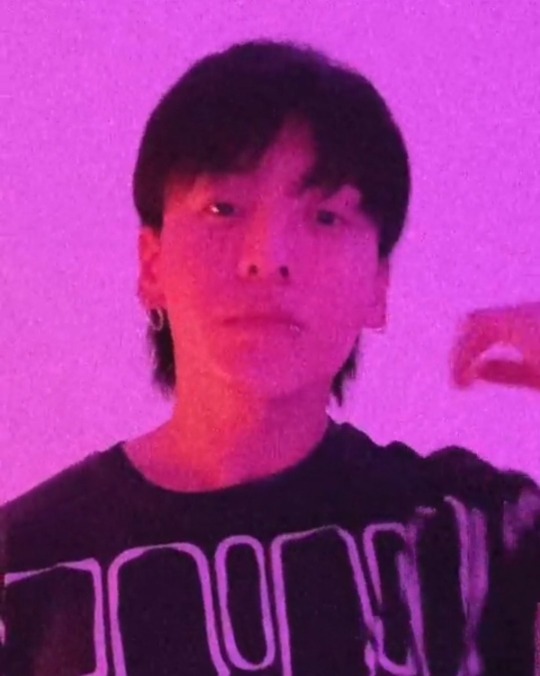
<<I realise its a few days ago now and you might be wondering 'what tiktok?' but I've been writing in snatches when I have a few minutes so it took a while. Anyway, here it is...>>
A few posts I've read have suggested JK did the silly>sexy Tiktok challenge backwards. That he did sexy>silly instead. That he was being random and funny.
I disagree.
What he did was unexpected, a little left of centre, and for the people who can read subtext, not random at all but very very clever.
I'll tell you why, (It may not be what you think) but first I need to vent about two things:
1. Give the man some credit. He knows what he's doing.
There are some who love JK but who see him as a naive innocent. He is not. He isn't a child or a himbo.
Saying he did the challenge just because it's trending, and he reversed the order of the content for a bit of a joke, is insulting to him as an artist. It would suggest he has no forethought or understanding of himself or his (global) audience, and his decisions are made on impulse with no idea of the consequences.
He's very intelligent and has plenty of experience with digital media and creating content. Besides being involved in producing complex visual narratives as part of BTS for the last ten years, he has directed and produced seven highly polished and professional GFC videos. And don't forget the MVs for Life Goes On. For the October issue of Vogue Korea he took on the role of Creative Director. That's a pretty big deal. So we can assume he knows what he's doing.
If he produces content in a particular way, it's because it enables him to communicate what he wants to communicate.
2. You may not understand the message. That doesn't mean there's nothing to understand.
A heads up to people who can't work it out... your inability to grasp meaning doesn't equate to 'no meaning exists'. Suggesting that people who recognise what he's doing are reaching or delusional is an insult to both the audience who can read this situation, and to Jungkook, who is sharing his message.
Consider a system of writing you can't decode. Lack of comprehension doesnt mean the writing is meaningless, it means you don't understand the language.
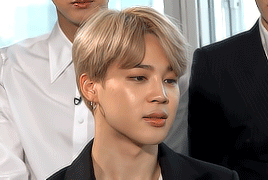
Even if you believe you understand what's being said, please recognise that context may play a role too, that it could reveal a richer and deeper message. Don't just assume the easiest (laziest) interpretation is correct.
(You may have guessed, someone suggested I was 'behaving like the cult' when I pointed out that JK's tiktok was more than being funny ... and now I'm mad 🤣)
Vent over. Now back to he topic at hand...
💜💛
What was he was really doing? And why is it not at all random?
Let's take a step back to recall what army has been saying about this...
Almost every interpretation i read suggests he reversed the order (silly>sexy becomes sexy>silly). The reason given is that his tiktok only makes sense if the order is reversed, and this idea is backed up by the caption saying "I go the other way".
But the 'reversed order' theory is based on a hereronormative perspective of what's sexy (and a stereotypical perspective of silly.)
So consider the content of his tiktok from a queer point of view...
For a man in a relationship with another man, the idea that he's with all those women is silly.
It's silly to believe he's got a girlfriend - or several. It's silly to think the womens' names in the song are relevant to him.
He posted this tiktok at a time when he's releasing music that fits the western pop norm of boy + girl, and when rumours of him dating several women at once are rife. The timing is not a coincidence and nor is the choice of background song for this.
All these assumptions and rumours are pretty silly, JK is telling us.
Now let's talk about the second part, the sexy part. Yes it may look silly on the surface, but we have seen him and Jimin make dorky faces at one another when they're flirting. It seems to be the visual equivalent of calling Jimin 'Jiminssssi'.
It's just another way they create distance and avoid 'getting caught'.
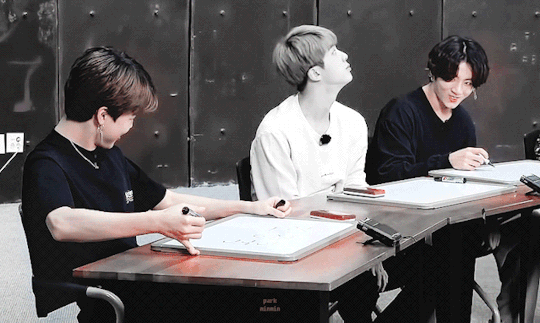
Maybe sexy for Jungkook actually is lying on the couch in your sweatpants making corny faces at your boyfriend.
Remember that he puts out 'stereotypical sexy' on command as part of his job so maybe that doesn't feel very sexy to him. Maybe that's work.
In my view (I know this is subject to interpretation) they've been together for years now. This is not the first flush of love. When you've been with a partner for a while, sex is (hopefully) more fun and less serious. Maybe it's about having the confidence to be wholly unselfconscious.
(My partner makes a Pepé Le Pew face at me when he's goofing. No, i don't know why either... 🤣🤷)

But wait, what about that caption?
What about 난반대로 간다?
My beautiful Korean friend (who sadly has zero interest or care about jikook) confirmed the literal translation:
"I go the other way"
"I take the opposite direction".
It's not "it goes the other way" or "this goes the opposite direction". He's referring specifically to HIMSELF.
Jungkook goes the other way.
But it's more than that according to my friend.
It's a bold statement:
"I don't follow the mainstream."
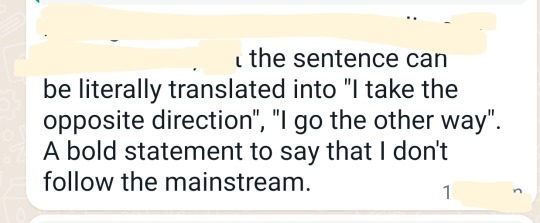
It reminds me of his tattoo ...
RATHER BE DEAD THAN COOL
He doesn't do things just because everyone else is doing them.
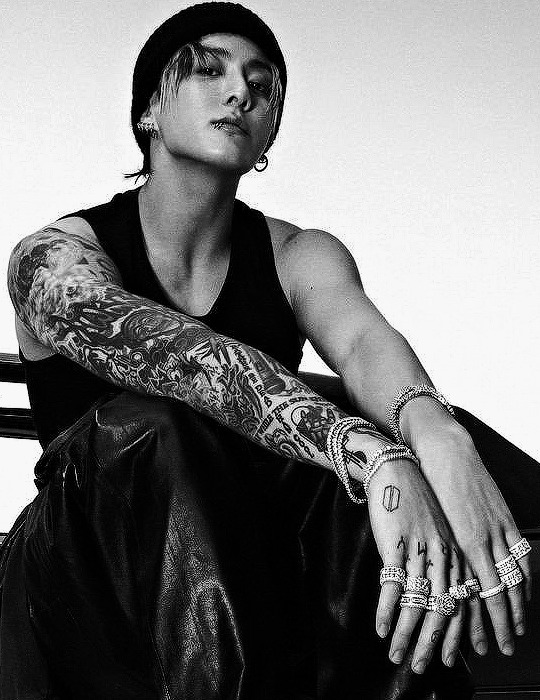
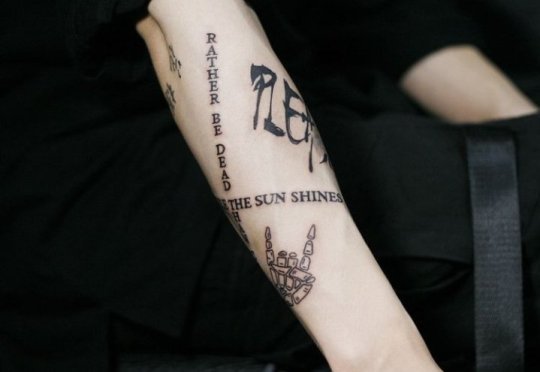
"I don't follow the mainstream."
OK. HOLD UP.
This is where it gets interesting.
Then why would he do something as mainstream as a trending tiktok challenge? Especially something as vapid as this challenge?
And why would he tell us DURING that Tiktok challenge that he DOESN'T follow the mainstream?
And then delete it.
Creating content takes time.
And we know he's a busy man.
He's about to release an album. He's doing live performances. He's prerecording for music shows. He's overseas right now... for the fourth time in a month! Does he have time for this??
And he DELETED it...
Did he just WASTE all that time?
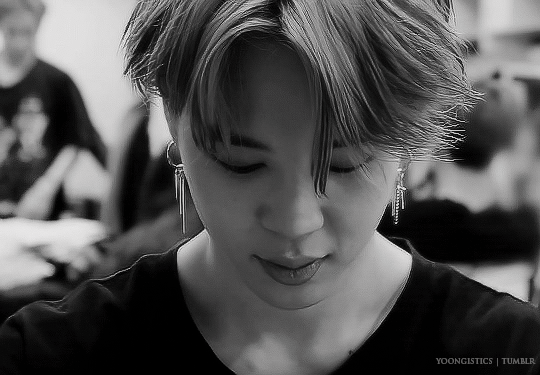
No, he did not.
He deliberately chose to do this.
He did it knowing ARMY studies every action, every video, and every media release.
He did it knowing ARMY would already have copied the video before he took it off his profile.
He said on Stationhead that he knows ARMY has it, and is sharing and posting it. He's FINE with that.
So he took the time to create and upload that video. He wants it out there.
He just doesn't want it on HIS page. That's an important part of the story.
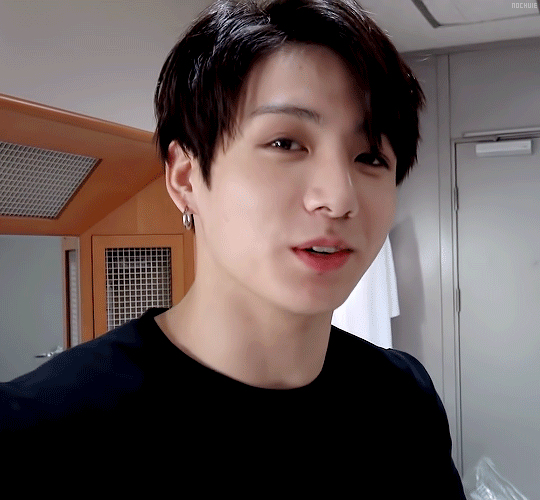
So lets go back to the caption.
"I take the opposite direction"
"I go the other way"
"I don't follow the mainstream."
*Said boldly* remember. It's a loud statement, captioning an otherwise pointless very mainstream trending challenge.
So if he's not referring to tiktok itself, or to uploading challenges, what could he be referring to?
...
...
There's only one thing left: Himself.
I take the opposite direction
I go the other way
I don't follow the mainstream
Essentially... I swing the other way.
There's no way a queer man would make that statement and not fully recognise the message he's sending.
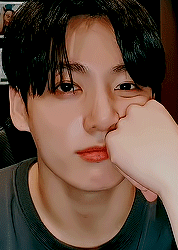
As for deleting the video, I'd say he knew it was too risky to leave on his profile, being a celebrity in Korea. He's managing his brand. Deleting it also gives him plausible deniability. He can say he made an error. As I said, he's very intelligent. He knows ARMY will see it and share it. He knows that those of us with a queer eye will hear the message loud and clear.
🏳️🌈🏳️🌈🏳️🌈 And we do hear it. 🏳️🌈🏳️🌈🏳️🌈
253 notes
·
View notes
Text
On Boston and Brian Kinney

I’ve seen a lot of folks in the Only Friends tag recently making connections between the show and Queer as Folk, both US and UK versions, which makes sense because QaF is a clear reference for the show, both visually and thematically, and we know Jojo likes to reference western media in his work. One parallel folks are drawing is not tracking for me, however, so I am jumping in the wayback machine and putting on my old QaF stan hat to talk to y’all about Brian Kinney, and why Boston is actually nothing like him. Tagging @bengiyo and @neuroticbookworm who talked this through with me and also @slayerkitty because I saw you were contemplating this connection between the two characters.
So, first, why are people making this comparison? It really boils down to one thing: Brian and Boston are both sluts. That’s… pretty much it. They both like sex and prefer to have it with many different partners, and neither has much use for monogamy. But this is pretty much where their similarities end.
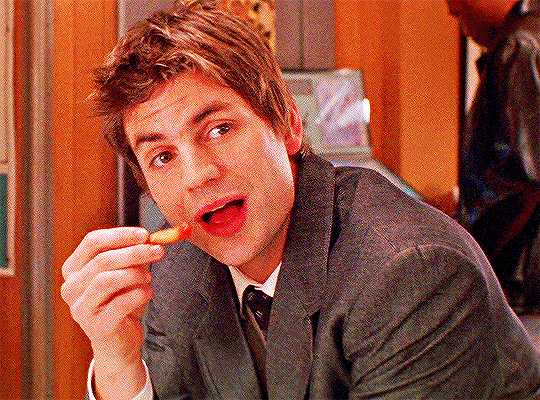
So let’s remind ourselves who Brian Kinney is: a kind of fantasy of a hot, rich, self-actualized gay man with unmatched sexual prowess and a surface level flippancy masking a heart of gold. Brian is an adult man with a thriving career and money that he earned for himself after leaving his abusive and homophobic family (who would eventually explicitly reject him because of his sexuality). As a result, he is defiant in his commitment to live his life as loudly and queerly as possible—which includes a dedication to fucking and sucking, public sex, and a rejection of heteronormative constructs like monogamy.
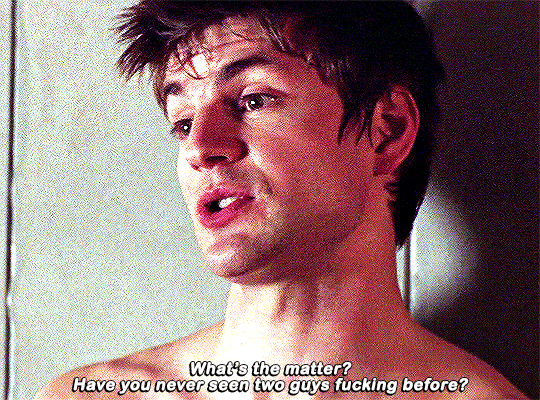
Brian has a very clear moral code he lives by, even if it’s not one most can relate to. He decides to have a son with his (lesbian) best friend because part of him wants to believe in a better future and build a family of his own. He is extremely loyal to his found family even as he’s a jerk to their face most of the time, and he is always working behind the scenes to protect them even as he often hurts their feelings with his glib remarks and shitty behavior. Despite his disdain for monogamy, he never actually tries to destroy any of his friends’ happy relationships (in fact, he tries to sacrifice his own friendship with Michael to ensure he stays with his boyfriend).
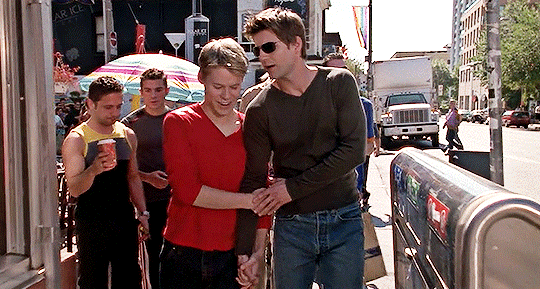
Brian has a sense of responsibility to others and often takes on the blame for things he didn’t even do, which is why he takes baby gay Justin to Debbie and ensures he is cared for even as he tries to dissuade Justin from getting attached to him, and why he cares for Justin in the aftermath of his bashing. He cares deeply about his community, to the point where he pours his money into protecting the local gay scene, literally bankrupts himself to stop an anti-gay politician from winning an election, and gives up a dream job to stay put in Pittsburgh and help rebuild the community after a hate crime.
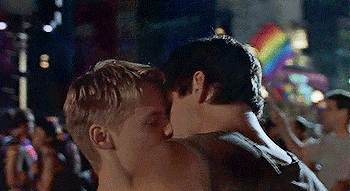
Brian is unflinchingly honest and he avoids making promises because once he does, he knows he will absolutely keep them—he takes his commitments seriously and he always does what he says he will. When he falls in love, he does not abandon his core values but he is willing to make some compromises. And he hides his better self and often wallows in self-destructive behavior because he feels deeply unworthy of love, which goes back to the intergenerational trauma he experienced as a child in an abusive home and the parental rejection he felt due to his sexuality.
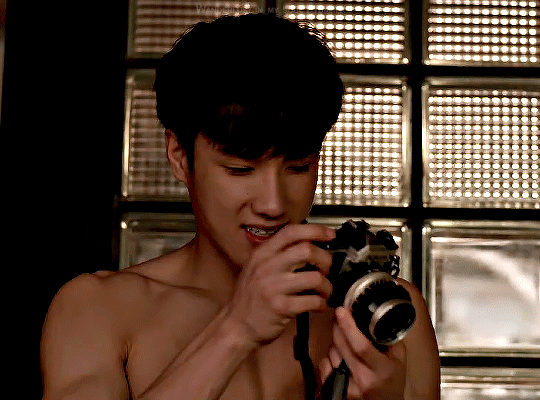
Boston, by contrast, is a character who feels more rooted in reality. He’s a pampered rich kid who is indulged in his hobbies and who already has a life plan laid out for him and paid for by his daddy. He likes to sleep around mostly because it’s fun, and because he knows his life here is temporary so he doesn’t see any point in getting attached to people. In stark contrast to Brian’s out and proud and fuck you if you have a problem with it brand of politics, he is still trying to hide who he is in service of his father’s political career, even if he’s pretty sloppy about it (see him fucking Top in a car with giant windows parked in the driveway at a house party).
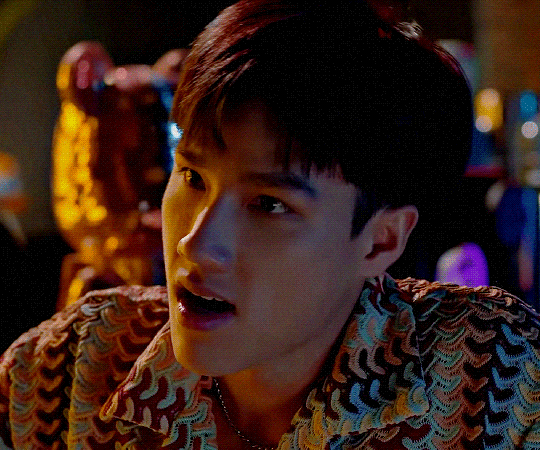
Boston’s moral code is fungible and ever-changing to fit his circumstances—boy is a hypocrite (see his opinions about people filming and photographing him even as he does the same to others constantly). He has no loyalty and no qualms about hurting and betraying his friends, and actively tries to destroy their relationships for sport or as a means to get what he wants. He does not feel responsible for anyone and often lies and ducks accountability for the things he does. He does not care about his community at all, and in fact already has a NYC escape hatch in his back pocket for when he inevitably burns his bridges. He is not as honest as Brian and sends a lot of mixed messages to keep people guessing and on the hook.
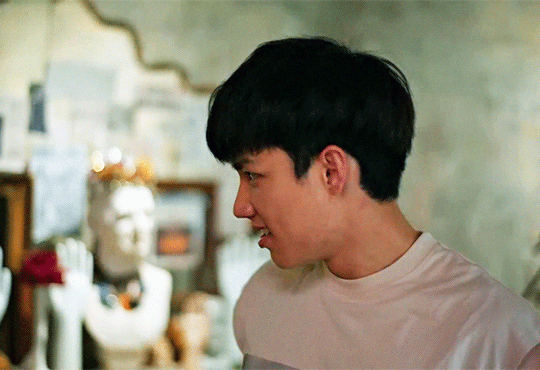
Rather than hurting people by being brutally honest as Brian does, Boston plays psychological games and manipulates his friends and lovers, and he seems to take twisted pleasure in blowing up their happiness. We haven’t seen him make a promise or fall in love, and while there are some signs that he may have some sort of inferiority complex at play (with Mew in particular), his motives are not tied to any past trauma. Boston is just a messy bitch who loves chaos and doesn’t really care who gets hurt as long as he gets what he wants and stays entertained. Where Brian is literally a superhero to his loved ones, Boston is just a very flawed human being.
But Shan, I hear you saying, I thought you liked Boston! I do, besties, I do. He’s a fantastic character and a very real kind of person many of us encounter in our 20s. Because that’s the thing: Boston is so young. He hasn’t developed any sense of responsibility to others or any understanding of the importance of queer community, and he has never had to take care of himself, which is perhaps the biggest difference between him and Brian. Brian has lived independently for more than a decade when we meet him in QaF, whereas Boston is a spoiled rich kid who has barely lived. Brian is a fully realized adult and his more nuanced characterization is a reflection of that; Boston is actually a pretty basic chaotic drama queen who will grow up eventually.
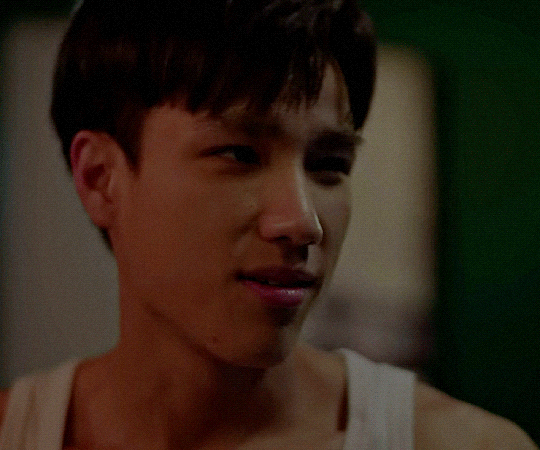
TL;DR: Aside from being promiscuous, Boston has very little in common with Brian Kinney. He is more a reflection of a very real kind of person you will meet on the scene in queer communities than an homage to a larger than life fictional QaF character. And while OF is absolutely referencing some of the themes and values and stylistic flourishes of QaF, it is not making direct parallels to its characters.
#did i write this mostly as an excuse to get brian kinney on this blog?#who can say#only friends the series#queer as folk#thai bl#ofts#only friends#ephemerality squad#shan shouts into the void
232 notes
·
View notes
Note
Can I ask, why do you love BL romance better than het romance? What makes them better? I did not mean anything negative, and I know everyone have their own like and dislike but I want to know your thoughts....
Also what do you think that made Asian MLM (BL manga/manhwa/manhua/ danmei) romances better than western MLM romances?
Can I ask, why do you love BL romance better than het romance?
Because I had no choice for many years.
Because that choice was taken away from me by a homophobic, transphobic, queerphobic, acephobic society. So all the romances I read had to be heterosexual, all the romances I watched had to be heterosexual, all the romances I heard of had to be heterosexual.
Because I'm not heterosexual.
Because I never saw myself represented in any stories ever, for over about 20 years (queer stuff existed, but where I was situated in Perth, Western Australia, meant that I was not seeing it).
Because I was force-fed allonormative, heteronormative, heterosexual tropes, bullshit, toxicity, misogyny, patriarchal culture, rape culture and more, and because everyone assumed that was normal, which made me feel isolated, marginalised, alone, and bereft, and cut me out of knowing what a life could look like for myself, and made relationships harder, when you don't have the words or stories to latch onto.
People like me couldn't even be erased out of the media, we hardly existed in the media, and if we did, almost never under our real identities, and almost always having to pretend to be something we weren't, for many people who hated us, or wished we were dead, or simply didn't care about us at all.
So, when I finally got a choice, I made a choice.
And I do not want to read heterosexual content anymore, unless it's queer (like T4T). The only place I actually willingly consume heterosexual romantic content these days is like 80s and 90s and early 00s romantic comedies. It's the only thing I allow through my filter, because so many of them have a really strong bent of hurt/comfort in them, and it's rare to find movies that have this in general.
But yeah otherwise het is just not a thing I look for in fiction. Literally a squick. Literally reminds me of 20 years of oppression in the mass media. It's not inherently bad, it just wasn't good for me personally, to never have a choice.
So I made one :D And my life has been so much better for it. I'm never going back.
Also what do you think that made Asian MLM (BL manga/manhwa/manhua/ danmei) romances better than western MLM romances?
It's just better for me, anon! I find a lot of western published m/m (so not like m/m fanfiction which I still read) often feels stifled and too short for me, and the characterisation doesn't get as deep as I want it to get. I often can feel the rigidity of the novel structure on authors who are trying to rapid release, and the depth I'm looking for is rarely there. Sometimes that's what people want! Sometimes they don't know there's other options!
Sometimes that's true of some BL manga/manhua/manhwa etc. as well. Tbh it's probably true of a lot of it! Serial format doesn't always allow for depth either. But I find the visual format easier to read as well. If I reread western m/m it's almost always fanfiction. And tbh, I'm sure some amazing m/m was published last year, I just get tired of having to wade through it all to find something I like. It got to the point where I was reading like 60+ titles just to find one average read, and I gave up.
The recommendation systems for BL tend to be better and more on point for me, I find most people who recommend published m/m to me generally always miss the mark (which isn't their fault - I'm particular, there's a reason I write what I write - because I can't find it to read!!), but close friends like @morbidlizard who recommend BL to me almost always hit the mark!
I don't actually read much danmei, but mostly because I haven't had time to really sink my teeth into it. Aside from MXTX, I haven't explored much further.
But yeah, hope that helps! :D
#asks and answers#personal#can't even put inadvertent recs on this#honestly 'rapid release' was kind of the death of it being easy to find a lot of good#m/m fiction being published#it's still out there it's just way more 'needle in a haystack'-y than it used to be#also there's way more fandom tropes like hurt/comfort etc. in manhwa and manga in particular#so it speaks a language i prefer#like Define the Relationship has SO many moments of hurt/comfort#just over and over again#i find published novel-format m/m just really kind of misses the mark on this#and honestly i include my own stuff in that#the novel format isn't super friendly to it#compared to the serial format#i'm sure that's not true across the board#it's just true 'so far'
55 notes
·
View notes
Text
conversations about representation have always felt so navel-gazing to me, in part because those conversations tend to remain at the level of individual characters. the focus is on representing individuals as meaningful examples of the groups they belong to - to have “good” representation is to see some component(s) of your social identity reflected back at you by a character without those being the only traits of those characters. To measure representation you first look to see if there are visual or descriptive markers of identity - skin colour, gender, sexual attraction, ability - and then, once that evidence is established, one looks at how characters interact with and contribute to the narrative. does this gay character have a romantic partner? does this black character have interiority not related to their relationship to white characters? is this woman character motivated by something other than a desire to impress men? The goal is to avoid stereotypes, to be an anti-stereotype.
And so you ‘solve’ representation through the adequate presence of these characters. But I think this is an inherently individualistic and anti-liberatory way to approach representation, because it views minorities as individuals who can be cut from the social fabric of real life and transported into different fictional universes while leaving their identities fully intact. The presence of a disabled character does not also require the inclusion of structural ableism in the narrative, their individual presence is enough to represent disability. And so their presence in the narrative seems to emerge from nowhere - you don’t judge representation by looking at how the narrative represents and thinks about historical structures of race, gender, ability, you judge it by the amount of characters who contain those social markers. It means social identity exists primarily within the individual. There is no historical perspective given to characters, no acknowledgement of the fact that identity is dialectic and socially mediated. to paraphrase Gramsci, history impresses upon you an infinity of traces without leaving an inventory, and I think when discussing representation, people judge the quality of representation by those traces - race, gender, ability, sexuality, religion, etc - but ignores the inventory, the origins of those things, the social processes that produce race, produce gender, constantly and everyday. And so you get these characters that feel dislocated, alien to themselves and other people, because they express an identity that appears to have no origin point in the fictional world, no social backing. They are essentialised to what they “are” deep down inside. Characters are not made racial, not made gendered, not made disabled by the universe they exist in, they simply “are” those things.
And if narratives do tackle those histories, they tend to represent them primarily through misery. You know a character is gay because they get called slurs. You see a black character experience racism. You recognise a character is a woman by the fact that she is sexually assaulted. The history of their identities is represented as individual acts of violence or trauma, as if misogyny or racism are narrative objects themselves that occasionally collide with the characters to remind the audience that the authors take history very seriously. If an author is especially serious, they will get individual sensitivity readers to confirm or deny the authenticity of the social identity being expressed on the page; much less often you will hear of authors who rigorously consult, for example, books like Orientalism to ensure the structure of their work is not reproducing Western (and ultimately racist) conclusions about the world they are creating. Representational politics begins (and frequently ends) at the level of the individual. And so you get queer characters who endure homophobia or transphobia, but whose ultimate wish is to enter into a monogamous marriage and reproduce the social unit of the nuclear family, or the black character who finally finds community in a group of all white people that aren’t racist to their face. That’s not tackling history, that’s just allowing these character to be momentarily exempt from it. the historical norms and hegemonies present in the narrative are disconnected from the characters themselves. this is why you can have “good representation” in stories that are fundamentally racist or misogynistic or heteronormative (see: ofmd). If representation is only housed in your characters, if you view representation as a discrete trait that you can add more or less of, you are not thinking about the social identities that you are representing in a systemic way - you are, in effect, producing tokens.
And I think that sense of dislocation is part of what motivates people to cringe away from stories primarily billed as having “a diverse cast” or filled with “queer characters” or whatever, even when they are otherwise desperate for those things (excluding from this discussion the people who dislike the mere appearance of characters who are not strong white men, a perspective that is not worth entertaining). I do not want to watch stories that smash characters and identities together like barbie dolls, that treat race or gender as something to “tackle” in a B plot or a “police brutality episode” like you get in a show like Brooklyn 99. I do not want a character creation screen. Identity should, ideally, be part of the structure of the narrative, not a thing you merely choose to “include.” Which is much more difficult, of course - it requires a robust political imagination, but it’s a problem that is possible to solve.
#effortpost#media#book club#been thinking about this for a while and it’s slowly being crystallised in my brain#also not bashing sensitivity readers inherently. I just think that thinking about representation as something that can be ‘confirmed’ by#individual members of a minority group creates problems#because minorities are not a monolith#and the realm of personal experience kind of inherently limits your ability to think about these things#at the level of systems of structures
182 notes
·
View notes
Text
"Scholars often dismiss physique references to ancient Greece as a mere ruse or rhetorical framework--a "classical alibi" or "discourse of validation"--to avoid censorship. But an examination of the lives of the founders, contributors, and members of the [physique studio and pictorial] Grecian Guild [1955-1968] tells a different story. The Grecian Guild was instrumental in helping a community of men struggling to find a discourse to explain and valorize their sense of themselves, particularly men outside of urban gay enclaves. Benson and Bullock [the founders of the Grecian Guild] took a discourse about ancient Greece that gay men had been using for nearly a hundred years and gave it mass distribution. They used it like gay men used reference to "the Greeks" or Mary Renault novels--as a way to signal their homosexuality. It was a rallying cry that brought in customers and helped them imagine a better world. As historian and biographer Benjamin Wise argues about the way Alexander Percy used the language of Hellenism, it was "a way of speaking out and covering up at the same time."
Invoking classical traditions in order to make an argument for gay rights has been largely forgotten in the twenty-first century, as such a line of argumentation has become politically and historiographically problematic. Indeed, much of modern LGBT historical scholarship and queer theory has asserted that a homosexual identity is a creation of a modern, capitalist world--that homosexual behavior in ancient cultures was understood in very different terms from the way it is today. Invoking classical antiquity also smacks of a Western bias that privileges European ancestry over other cultural and historical influences. Such arguments also raise the specter of pederasty and pedophilia--or at least age-discordant relationships--that play into the hands of gay rights opponents who relentlessly use the argument that gays recruit children to fight gay rights measures...
Despite these changes in cultural understandings and sensibilities, the use of the classical Greek trope to name gay organizations, periodicals, and commercial ventures continued for decades, even when the need for an alibi had eroded if not disappeared. The lambda or lowercase Greek "L" became one of the primary symbols of the 1970s gay liberation movement. During this same period Seattle's largest gay organization was the Dorian Group, and a Jacksonville, Florida-based gay magazine called itself David--a reference to Michelangelo's Renaissance statue--an indirect link to the classical tradition. Like the Grecian Guild, David offered membership in a fraternal organization with features such as a book club, a travel service, conventions, and even legal aid. As an online website, it continues to serve as one of Atlanta's premier LGBT news and entertainment sources.
...
While severely limited by the forces of censorship, the desire to create opportunities for customers to correspond, meet, and get acquainted attests to the palpable wish of gay men to connect with each other during this period. If few members attended a Grecian Guild convention, the possibility of doing so resonated widely. As a teenage Grecian Guild subscriber in Pawtucket, Rhode Island, Michael Denneny read the articles so carefully that he underlined the important parts. "That was proto-political organization, the agenda was very clear to me, and I think to everybody else who joined," Denneny remembered..."These magazines were really important to me," Denneny recalled. "They brought this whole possible world into being, which I'm not sure I could have visualized otherwise."
David K. Johnson, Buying Gay: How Physique Entrepreneurs Sparked a Movement
#queer history#thinking about aang and zuko's connection to the deep past#aang's strange displacement from his people and history#that means he has this distinct lived connection to a by-gone civilization and idyll#and then zuko's obsession with the air nomads#going to all their temples#and in the natla collecting all the nomad and avatar relics#then later their exploration of the sun warrior past#another ancient civilization whose philosophies they seek to adapt#and how both of these relate to aang and zuko's exploration of their gender and alternatives to contemporary masculinity#these fascinations with lost civilizations bring aang and zuko together too#and even force them to address assumptions about age-differences...#just a lot to unpack#just about how exploring other cultures and history thoroughly dislodges one's construction of reality#and opens up possibility
14 notes
·
View notes
Note
https://twitter.com/V36260523Vilas/status/1715762558437577010?t=ouEBPuNHflKWYUrdNVtCUg&s=19
There is a reason why Taekookers mostly come from SEA countries and why Jimin is the most popular member in EU and the US and has the most antis in SEA countries. The backward social state and lack of progressiviness in those countries and the fetishizing of Western characteristics is the reason.
Thailand, Vietnam, India, and Indonesia are the most countries crawling with Taekookers, and they're also coincidentally the countries where Jimin is the least liked member. A lot of correlation there.
Homophobia rates in these countries are high too, so how come there's so many Taekookers there? Ah right, that's because the shippers there don't actually believe Taekook are queer, if they had, they'd hate them as much as they do Jimin, who's in every way queer except for explicitly said. There, they don't actually support queer people or relationships, they fetishize a made-up —visually appealing (based on the Euro-centric beauty standards there)— queer couple because it's safer for their self-insert fantasies than seeing those members actually have individual dating lives, either with other men or with women.
Wow anon! Just like, wow! There’s seriously so much wrong with your thoughts here, I can hardly choose where to begin!
You are being racist, elitist, uninformed, and just plain ignorant all in one post. Do better! Think harder!
You are also very blind if you think Tae and Jk don’t look like Koreans.
13 notes
·
View notes
Note
I mean- I'm going to be talking as an ace queer person (not aro), so my experience and views are subjective, obviously. Romance is basically an attraction to another person, no?
'Romance or romantic love is a feeling of love for, or a strong attraction towards another person, and the courtship behaviors undertaken by an individual to express those overall feelings and resultant emotions.' - Wikipedia
For me, the difference between platonic and romantic is not the action being undertaken itself, but the intent behind it. If we're talking physical closeness, there's a difference between wanting to hold hands with someone you're ATTRACTED to, and someone who you only have platonic feelings for. I do hold hands with my friends sometimes. It's a very casual and simple thing. I can attest that there's no romantic connotation behind that whatsoever, and it feels completely different to how it would if I were holding hands with my partner. But I also do want to hold hands with people I love romantically - because I feel romantic attraction to them, and I want to be close to them physically.
The difference is in the intention and feelings, really. And feelings are... notoriously subjective, obviously. Thus why I don't think bringing up aromantics was really a good idea. Queer identities are a notoriously personal and emotional thing to talk about, and you're bound to say something hurtful if you lack that experience, though unintentionally.
As it is stated in the Wikipedia description, romance is a FEELING of attraction. And 'courtship behaviors' wary from person to person based on their culture, upbringing and even their personality.
So I guess what I'm saying is that it's a complicated conversation that everyone will have a different opinion on, based on their identity. And that's why it's so tricky to talk about.
i am a western person with a western perspective who was talking about western people with western perspectives.
i have continuously said that expressions of romance are cultural.
STOP BRINGING OTHER CULTURES INTO A CONVERSATION THAT'S NOT ABOUT THEM.
in a western cultural context, wanting to hold hands with or cuddle with or kiss someone is an expression of romantic desire. this is why it is unacceptable to monogamous people for their romantic partner to do these things with someone other than their partner. "but i did it platonically" is not an acceptable excuse, because we have culturally decided what these actions mean. it's "more than friends" behavior.
even on the flipside of things, one of the most common ways that women protect themselves from creeps while out with friends is to grab the hand of a guy friend and tell him to pretend that he's their boyfriend -- because the sheer visual of two people holding hands is romantic in nature.
so, if you find yourself yearning for that, and you're a western person in a western context, you're yearning for something that you have been raised culturally to see as romantic.
and if you have a situation with your friends where these things are acceptable, then... you're still more than friends. you're friends with benefits. because you're in a pre-arranged agreement to glean intimacy from one another in this way with no emotional strings attached. that's what it means to be friends with benefits. that's more than friends, because regular friendships aren't like that.
i was also speaking in generalities. are there tiny little micro cultures throughout the west where this is a thing? where those expressions of intimacy are completely removed from any romantic intent? sure. but in general, 99 times out of 100, if you find yourself yearning for someone's physical intimacy, you're experiencing a romantic longing for them in a western context. this is how you were raised culturally, and it takes A BIG EFFORT over MANY YEARS to unlearn that and decouple those two concepts.
very often, i see people use "aromantic" as a stand-in for "i don't want a relationship" -- but that's not what it is. but to experience that longing, to experience that yearning -- that is a romantic feeling. even if you don't want to be committed to that person. even if you have no desire to devote yourself to them at all. it's still romantic in nature, because culturally, those things are romantic.
and i have a really hard time believing that random 20 year olds on the internet have managed to completely decouple themselves from their cultural upbringing and totally decontextualize these actions to such an extent that they exist in their own micro culture. more often than not, these are young people who are intimidated by intimacy and sexuality and don't really feel comfortable with who they are yet, so they slap the word "aromantic" on themselves because they don't want to be bothered with romantic pursuits -- but that doesn't mean that they're wholly disinterested in romance.
there's been a pushback in recent years against anything surrounding the words "romance" and "romantic" and that is really what my initial statement was about. "romance" has become almost a dirty word in some fandom spaces, because of people's own personal discomfort with vulnerability and flaws in themselves and others. if it's not romantic, then it's less vulnerable, and so people strive to be as invulnerable as possible.
3 notes
·
View notes
Note
The queer thread didn't really get critiqued for shipping purposes though, it was mostly critiqued for the abundance of harmful western stereotypes slapped onto an asian cast and media (Tsukasa is emotional therefore feminine (misogyny!) therefore queer) and borderline if not outright racist inclusions (such as VBS gets partying, drugs, sex related content) which is a strange thing to say about the group based on street music which originated from black culture.
I don't think it's fair to write it off as just that when this is the type of rhetoric that sends discussion of queerness back several years by boxing queer behavior in via homophobic stereotypes. It's really truly incredibly regressive.
ftr i did not read past like the first few tweets of that thread when i posted that ask. i went back and read the full thing later and yeah it was very...how to put this, Not Good and some of their characterisations were incorrect too, airi's section stuck out to me in particular
there were several things wrong with that thread for a start, which you've already pointed out and yeah after reading the thread i totally agree that the OP was rightfully called out. historically when the topic of queercoding has popped up in this fandom (in any way actually, not just applying to like Rui or An) it tends to get jumped on pretty quickly by people arguing about shipping. that's why i mentioned it and it's what the anon was talking about (i don't even know if they were talking about the same thread but i'm assuming they were)
i get what the OP was going for. they wanted to make a thread about queercoding that people couldn't start ship discourse over, which, fair enough. they just executed it absolutely terribly. also like the thing is that most of the queercoding is done through relationships, as with, most queer characters lol. you have to talk about shipping if you want to talk about how the prsk characters are queercoded. talking about visual codes and non-relationship related stuff can only cover mizuki, and shiho/rui/debatably akito to some degree for each. LIKE THEY LITERALLY SKIPPED MINORI BECAUSE ALL HER QUEERCODING RELIES ON HER ATTRACTION TO OTHER CHARACTERS.
i've been talking about their errors and doing actual research into the topics all day on my twitter actually! like full wikipedia deep dive on the japanese version of the site and i've been reading articles and blogs for like the past half hour. it kinda bummed me out that people were calling out the thread for its eurocentrism and stereotyping but wouldn't provide any corrections (i don't blame anyone for not making a second thread lol i just think it would've been cool) so i decided to do the research myself and then post it on my private twitter with 4 followers. but i've had a lot of fun with it! i'll put some of my tweets under the cut
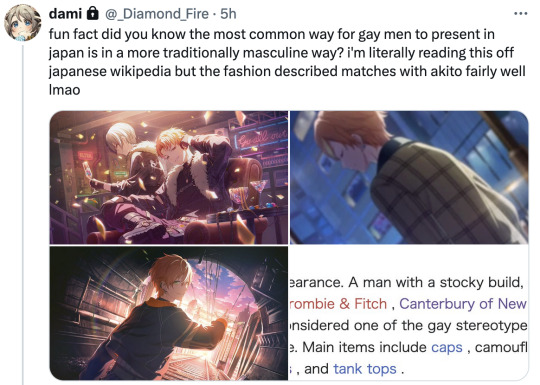
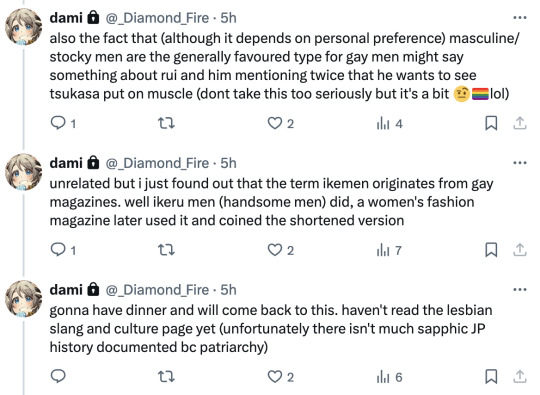
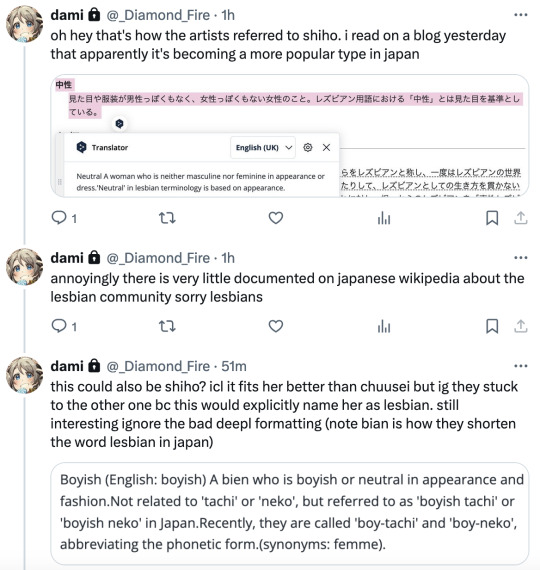
don't take all of this 100% seriously, it's mostly just me making little commentaries on my research (i'm still going actuallyoh hey when did it gets to midnight)
i also posted a powerpoint with some examples of queercoding (including shipping stuff) in the game here (this was pre-6 hour google deepdive though, but most of it still applies)
3 notes
·
View notes
Text
About The Project: "Still Alive, After Paradise"
I have a project to propose for the apocalypse. It's called, "Still Alive, After Paradise."
The premise is very simple: Lucifer, the son of God, and Michael, the great daemon of the Inferno, team up to take down God Himself, Elohim Most High. It's a very long run but the scales are about to tip.
Can God survive? Or is the 7th reign of the angels about to begin?
What I'm Doing to Make this Project a Reality:
I'm writing a book series called "Still Alive, After Paradise" that follows the long arc of Helel (Lucifer) and Mikha'el (Michael), with the intent of making an adult queer erotic series where the couple is already together and fully intends to/does win
Working with artist-friends to create the blueprint for the character apperances
Mapping the potential to enhance the experience with an adult visual novel game, giving players the chance to play with relationships and characters
What I'm looking for to Make this a Success:
Interested 'Bible fanfic' community members who enjoy angelology, the occult, and queer erotica
Social and financial support to complete the book and find an agent and/or self-publish (though I will be sharing parts of it to build the hype up)
To start a new fandom with hot, Castlevania-style characters who just want chaos all the time (especially Lucifer and Michael)
And, Who the Hell am I?
I'm a queer Black artist in the Western US that puts on community events and helps with theater management. I have a shiny, overpriced MFA and have been writing on places like FF.net and here since 2008.
I have everything up with a limited preview on my website here, Alive After Paradise. While I will do the bulk of sharing there, I will periodically post to here and Archive of Our Own under the #supernatural tag the more erotic parts as we make progress :).
Thanks for taking an interest. I can't wait to share more soon.
#angelology#archangel michael#lucifer fanfiction#lucifer x michael#i am also very familiar with#satan and me#angels before man#lucifer netflix#and more#come say hi or ask me q's!
14 notes
·
View notes
Note
https://www.tumblr.com/roleplayhonestybox/747103034285441024/as-a-queer-person-who-only-roleplays-queer?source=share
(Anon suggested that the heteronormative big top/subby bottom dynamic that runs rampant in the RPC is the fault of poor rep in media)
As a queer person, I have to politely disagree with this anon. Unless you're hyper focused on BL manga/yaoi media, there's a lot of good representation in media, especially western (not that there's a lot of representation, but the little we have doesn't really lean in on the trope). If you watch any decent series or movie, chances are there are gay characters or lesbians and bi characters in gay relationships, and they're just two regular actors with characters with believe personalities who like each other. The representation can be awful under other aspects but not this one.
The 6tf mean top vs the shivering, constantly scared, overly feminine sub who is 4 ft tall comes from the need of the "bottom" player to make sure they're never going to take an active role in the roleplay, to "call dibs" on their position of the one being coddle and loved and protected. OR it comes from the need to clearly, visually, separate the two muses into "male and female" because the roleplay stems from the fetishized idea of a gay relationship the female roleplayer wants to project in, but remaining "a girl".
When those two things meet it also starts to reek of misogyny too. But nope, nowadays you can turn on the tv and see two regular gay gyys kiss. The fault, this time, isn't the media, unless you only read yaoi.
.
2 notes
·
View notes
Note
what are some other good bisexual het romance series?
Honestly, I wasn't quite sure how to answer this! You likely didn't mean anything by it, but "bisexual het" really threw me for a loop 😭 😭 I would refrain from using that phrase in the future!
Anyway, I'm assuming you are looking for something like GSNK ❤️ Since I'm not sure what it is you like about GSNK, or who you are and what you usually read, I'll just recommend a bunch of stuff :p
I worked at a bookshop last year, so I'll start with my usual recommendations on LGBT+ manga/graphic novels (that are officially licensed in English). They're mostly coming-of-age stories. Linked is the instagram post with more recommendations, explanations, & summaries!
Also in this rec are: Manga with characters like Kashima (and relationships like HoriKashi)
I was gonna include a lot more, but this list is already pretty excessive 😅 This is scheduled to post tomorrow evening, but know I finished this at midnight!!!!!!!!!!!! (Happy Valentine's Day!!!)
Main Recommendations
My usual rotation of recommendations from back when I worked at a bookstore
Blue Flag by KAITO
8 volumes. My favourite series!! I have so many thoughts about it. Simplest way to summarize the theme of the series is in the first sentence, "Your best friend... or your lover. You can only save one." (implied: who would you choose?). Love triangle between the main character, Taichi, a shy female classmate, Futaba, and the main character's popular, childhood friend, Toma.
A lot of western fans complain about the ending, but I thought it was very fitting for the series. I might be biased because it's my favourite, and I can't necessarily justify myself without spoiling it >.<;;
CW for homophobia & outing as a major conflict in a later volume.
Our Dreams at Dusk by Yuhki Kamatani
4 volumes. Beautiful visual metaphors. Main character comes to terms with being gay & overcoming his internalized-homophobia.
CW for attempted suicide & homophobia.
The Prince and the Dressmaker by Jen Wang
1 volume. Focuses on gender identity and presentation!
Skip & Loafer by Misaki Tamamatsu
8 volumes (7 English localizations), ongoing. Has an anime coming out soon!
I reread it recently and joined their fan server, but I'm just lurking ^^; I feel like people who enjoy GSNK would also enjoy this series.
Although it isn't explicitly queer unlike the other two recommendations. It's still very charming! I really like the main character and her aunt. Even though her aunt is a supporting character, the chapter that focused on her made me cry a lot. My favourite characters are actually the aunt and the drama club president (a side character... but given his role, it tracks LOL /hj)
I remember when I first read it and didn't understand why people would call it WLW representation (I still enjoyed it though!) After my recent reread, I get it now >u< Even if it's not canon, I ship two of the main character's friends together.
I'm very curious to other people's interpretations~ My wife doesn't really read the same things I do, so I have to wait to watch the anime with her when it comes out before we can discuss it together.
The Prince and the Dressmaker by Jen Wang
1 volume. Focuses on gender identity and presentation! I picked it up because I liked the cover and I wanted to read more things by Asian American authors. I remember telling my sister it reminded me of Miraculous Ladybug (likely because the main character is a dressmaker)
Manga with Ikemen Girls (like Kashima)
Most, if not all, can be found on mangadex. Not all of them are HoriKashi-esque, but half of them are
The Story of How I Went to a Mixer and There Were No Women There
Only scanlated up to ch. 8 unfortunately 😢 I've started buying the Japanese volumes but my grasp of the language has gone downhill since I graduated lol
Pretty much as the title says! Some guy gets invited to goukon by a female classmate, but he and his friends find 3 ikemen when they arrive. Turns out his classmate and her friends work at a crossdressing bar! And they just didn't feel like changing back after work!
Story About How My xx Girlfriend Dotes on Me
Also known as The Androgynous Girlfriend is Doting on the President.
A cute short series (with short chapters) about the class president (unnamed until the 2nd "vol") and his super handsome, cool girlfriend, Natsuki. Under her stoic exterior, she's a little spoiled and very forward about her love for the president!
I thought this series was really cute! I want more chapters of them!!
Cigarette Kiss / Refrain Kiss by Yorumo (part of the Resonant Blue—Girl's Best Time collection)
2 chapters of a cute GL collection by the artist Yorumo! Kobayashi knows she's cute, and she flaunts it with the intention of hooking up with handsome guys! And to her luck, she was just assigned to work with the cool Akira. But it turns out Akira's a girl!
The only GL in this recommendation list...
Ikemen Dansou Reiya ni Koishiteru!! by Yunoki
AKA I'm in Love with a Handsome Cosplayer Dressed as a Man!!
Another title summary lol... Only 1 chapter has been scanlated so far. Is a remake of another series by the author with a (slightly) different title, but I recommend this version (restarted in 2022). The main characters have a lot of similarities to HoriKashi!
Assistant cameraman Kippei is invited to attend a cosplay event for the first time to get practice photographing people. He is immediately captivated by cosplayer Makoto. Makoto is equally interested in Kippei (he has muscle from lifting heavy shooting equipment after all!), but, not wanting to disappoint him, she continues to pretend to be a man in an attempt to get closer to him.
Tonari no Kinniku Joshi by Ano Amesuke
A short series about a muscular girl and a tsundere boy
Ruby (the muscular girl) isn't technically an ikemen, but I love their dynamic (maybe I just like tsunderes?) I also have no recollection on how I found this series but it was saved on my mangadex. Some parts of the scanlation read weirdly, and since it's a short series, the writing isn't the best, but I still enjoyed it!!!!!!
Not a manga but will include it anyway: the Taiwanese drama Bromance would also fall under this category! I remember when older HoriKashi fans and I would talk about how well it would suit them as an AU ^^
--
There's so many more I wanted to recommend for one reason or another (like My Crossdressing Senpai... I wanted to make a whole section about exploring gender identity or featuring trans characters... And then there's some that barely have any relation and I just think people should pick up like Ruri Dragon) but I've been working on this for the past 4 hours LOL
Anyway if you took the time to read all this, thank you ❤️ If you've read any of these, feel free to reply ur thoughts or which ur most interested in!
#ask#answered#I wasnt going to answer at first because the aforementioned phrase but I really wanted to share these series#I use my main blog for a hodgepodge of things but you'll sometimes see these series and others i find there#.... I say that but I think the only thing on this list I've reblogged there is Blue Flag....#oki it's 1AM I'm going to put this on queue! thank you for asking!#long post
13 notes
·
View notes
Text
Exploring Gender Fluidity and Aesthetics in Kabuki Theater and Oiran Culture
Torii Kiyomasu I's print depicts two individuals, an Oiran and what looks to be her client, in an amorous exchange. The courtesan is draped in a finely printed kimono that swirls around them, while her counterpart is draped in a long flowing kimono with flowers and other decorative patterns. The illustration of the kabuki theater within Torii’s work presents the modern day viewer with a history of prostitution that does not fit so nicely within a Western heteronormative structure. We are placed in this intimate space, the theater itself, to envision a relationship between courtesan and her client, which was more so reflective of male prostitution than experiences with the Oiran herself.
The Oiran were courtesans in Edo-period Japan who cultivated their femininity and sexuality alongside their education to attract clients. In the quarters of the courtesan, male social dominance was subverted in favor of feminine intellectual and aesthetic expression. The Kabuki theater was a common form of entertainment within the red-light district of Edo, and men often played female roles in productions. Kabuki actors also served as souvenirs, which allowed viewers to idolize actors through an easily reproducible image and engender the ability to travel with the emotive experience of the Kabuki theater and the clandestine environment of Yoshiwara. The physical presentation of the Oiran and the wakashu, or “apprentice actors who stayed ‘in the shadows’ and functioned chiefly as sex workers,” met within the medium of kabuki. The kagema, or kabuki actors trained to play women roles, often utilized the stage as a means to replicate and perfect one’s feminine impression.

Torii Kiyomasu I (Japanese, active 1696–1716), Kabuki Actors Nakamura Gentaro and Ikushima Shingoro, ca. 1710, 20 3/4 x 12 5/8 in. (52.7 x 32.1 cm), Woodblock print; ink and color on paper, Edo period. Metropolitan Museum of Art, New York City.
The figures of the wakashu and the kagema within the Yoshiwara are symbolic of a larger consideration of gender that rejected a stable consideration of sexual expression and desire. The ability to engage femininity both theatrically and socially alludes to the permissive space of the kabuki theater and the Yoshiwara as one of continual aesthetic experimentation and development. The erasure of distinction between the oiran or the onnagata (or kagema at large) seems to favor sexual fluidity in favor of strict binarisms that take root within the Yoshiwara district.
In conclusion, the kabuki actors who portrayed Oiran illuminates a deeper conversation about gender relations during the Edo period and their associated performances. Through the illustration of the kabuki theater within Torii’s work, we are invited to visually delight in the presence of the courtesan as if she were a real woman, despite an implicit understanding that she is not. The coalescence of the theater and prostitution is an important one, as it is where the physical presentation of the Oiran and the wakashu meet within the medium of kabuki. Ultimately, the ability to engage femininity both theatrically and socially alludes to the permissive space of the kabuki theater and the Yoshiwara as one of continual aesthetic experimentation and development.
Bibliography:
Harris, Frederick. Ukiyo-e: The Art of the Japanese Print. Tuttle, 2011.
Mostow, Joshua S. “Wakashu as a Third Gender and Gender Ambiguity Through the Edo Period.” In A Third Gender: Beautiful Youths in Japanese Edo-Period Prints and Paintings (1600-1868), 19-39. Toronto: Royal Ontario Museum, 2016.
Jackson, Reginald. “Translation Fantasies and False Flags: Desiring and Misreading Queerness in Premodern Japan.” In A Proximate Remove: Queering Intimacy and Loss in The Tale of Genji, 1-30. Oakland: University of California Press, 2021.
#art history#fresh creme#japanese woodblock#edo period#Tori Kiyomasu I#Japanese history#creme's library#academia
12 notes
·
View notes
Note
KICKING DOWN UR DOOR. UR LAST RB REMINDED ME. i’m v intrigued by tyk and i have finally decided to watch and/or read it :3 i think i found a place 2 read the book but i’m still lookin for a place 2 watch the show EITHER WAY I AM EXCITED. WILL REPORT BACK WHEN I’VE GOTTEN FURTHER INTO IT o7
HIII OH MY GODDDDD BOUNCINNNG AROUND SO HARD OH MY GOD. HI WHISKEY. ok ok ok. u can watch the show (free & legally !) on rakuten viki !!!! i would recommend watching the show first, eps r like. 45 minutes each, it is an extremely good show but not a very great adaption.
(my personal opinions: show is much easier to get into & is SO fun. good show looks super nice visually imo but i'm a sucker for bright pretty saturated color cdramas.. id take bad cgi & fun visuals anyday over gritty dark hollywood shit. tbh. sands down the mcs more + the textually queer romance is sublimated into EXTREMELY LOUD subtext that is nevertheless never said out loud. like it's still queer as hell but like,, less so than the novel. novel is one of my favorites of all time however its something of a heavier read! deals a lot with deeply morally grey characters who are fine with being that way + falling into a death spiral & being certain yr gonna kill yourself before u reach 27 & then changing ur mind at the last possible minute when it's so close to being to late + tangled and fraught relationships to desire & selfhood & personhood & intimacy. it's a long commitment though + i think probably could b hard to get into bcos cnovel prose translation often has a different cadence & style to western fiction!)
#whiskey tag!#ahhhh i'm SO SO SO excited i love tyk so dearly i hope u like it too!!!!!!!!#also i have advice for reading the book if u do decide u would like 2 do that first or simultaneously!!!!!! + if u do start em PLEASE pleas#come talk 2 me. god i love talking abt this fucking book it's everything to me. !!!!!!!1
3 notes
·
View notes
Text
✷ 𝓦𝓔𝓔𝓚 1 - 𝓟𝓸𝓼𝓲𝓽𝓲𝓸𝓷𝓪𝓵𝓲𝓽𝔂
𝒞𝓵𝓪𝓼𝓼 𝓷𝓸𝓽𝓮𝓼 ✶
Introductions! Our lecturer Holly Walker is a queer Pākehā creator, making conscious photographic works discussing the personal joys of being, all within the wider overhangs of colonial identity.
She also gets naked a fair bit for her mahi toi. Why? It's all about Embodied Practice - creatively tapping into the unconscious mind.
And as for the introductions of mine and others, we had these nifty forms to fill out and reflect on:
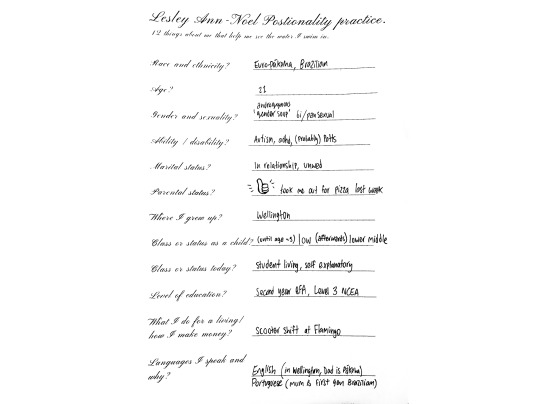
This first week sees the 'theme' of Positionality, a definition which, due to its breadth, Holly mapped out on the whiteboard as per classmate contributions.
Positionality for the individual - and this is an overall lumping of the many additions to the map - comes from experiences, physical expression, behaviors, privileges, relationships, trajectory, and history.
I was able to contribute with the 'trajectory' (or more accurately, timeline) suggestion, being the placement of self in one's life story, to plan in the long term, which is a reflection of one's privelege to even hold certainty to the future.
We then had a class exercise to identify the ingrained characteristics inherited from dominant systems of oppression - preceded by identifying Western Dualism - the binary of one against the other; this vs that. This is the first of an expansive sphere of ongoing colonial practices, habits and traces to be outlined in this class.
Holly presented a lengthy list of colonial legacies, to which we identified what affected us. They were subdivided into white supremacist, settler-colonial, hetero patriarchal, and class-elite behaviors; all wholly shaped by the mechanisms of colonialism.
Identifying mine became a 'fun' little game of figuring out where the autism ended and the colonialism began.
Perfectionism: It's a common trait shared in artists and autists alike - and I always assumed mine came from autism. A further chat with Holly helped specific the nasty sides of it - perfectionism is dangerous when you're holding others to your standard.
Individualism: This one I could hold more accountability towards. I compare myself to others a LOT, and a lot of my desire to 'succeed' (itself a colonial hallmark) comes from a selfish one-upmanship.
Objectivity: The idea that something is, because it is. 'Objectivity' is undisclosed subjectivity, built upon the dogmatic adherence to assumption, and goodness ME it's been a challenge these past five years to begin thinking critically.
Controlling/Micromanaging: While intrinsically linked to perfectionism, I can better identify my personal traits of such. Micromanaging is anti-collaborative, anti-community and deeply individualistic - of which 'my' standard can only be attained if 'I' take control, it's a slippery slope of elitism, which ALSO is another colonial trait.
𝓡𝓮𝓪𝓭𝓲𝓷𝓰𝓼 ✶
This week please start recording and contemplating the mapping and locating provocation in the brief. Spend time in your environment learning names, recording discoveries new to you about your location; refer to the brief to get you started. Start researching and considering ways in which you could visually represent your relationship to your location and what you are learning.
Catherine Delahunty - Becoming Tangata Tiriti
Delahunty outlines an experience at their first hui at a marae years prior - during which when it came to to introduce herself, presented herself as a "Pākehā mongrel", with ancestry in the 'British Isles'.
There is a lack of connection, which many Pākehā folk - myself included - can share to these origins.
"Usually, this ignorance isn’t uncomfortable, unless I’m on a marae or at a hui where, in effect, we’re challenged to bring our ancestors."
The general Pākehā ignorance towards ancestry stands against the the embedded tikanga of strong familial and ancestral connection in Māori community.
"In a sense, when the rest of us don’t know or don’t care about our own people’s past, it’s a way of demeaning or denying Māori their essence as Māori and, by extension, their rights as Māori. It’s as if whakapapa has no value.
"In te ao Māori, you walk into the future while looking to the past, but many of us Pākehā have been raised to think the past is way behind us in that place we call the mists of time. "
So Delahunty, eyes fixed on the past, followed her ancestral "scraps" to Ireland and Scotland - both sharing an experience all too familiar of English terror, of a devastating genocide, of stripped rights and a shrunken tongue.
"The Highlands and the west of Ireland were a brief and gorgeous story for me, but, although it was ancestry, it wasn’t home."
The coloniser is still the coloniser - she could trace, with some broad stroke, her ancestral past in those lands, but here, she is tauiwi, and can neither claim her maunga, awa, moana or whatnot here - or back there - the experience is not hers to share; an not worth feeling sorry for, either.
"So, renaming places and claiming other ancestral relationships hasn’t felt right to me."
Delhunty ends the article with claims of her own - one of being Pākehā and tangata tiriti. To live here, but not assert herself - it's a complex and heavy introduction with generations of baggage and I won't even bother with concluding it.
RNZ -Land of the Long White Cloud | Episode 2: Inheriting Privilege
Jen Margaret - "As Pākehā, we don't have the tools to understand the 'now', as we don't understand our history"
Personal, Pākehā conflict of history - "...wanting it to be different than it really is"
Familial history of supporting Māori rights - her great great grandfather, for instance, was outspoken towards the representation of Māori in parliament; and on the flipside, was awarded two plots of Ngāi Tahu land for winning a race - the very land that the people he was supporting were fighting for.
Narratives - "...what I was needing/wanting my ancestors to be."
"Obviously I do stuff because I want to shift our understanding as Pākeha and our work to honor Te Tiriti. But within that, I don't step out of my Pākehā privelege."
0 notes
Text
vimeo
Vellum LA is thrilled to announce Ipseity, Enrique Agudo’s first ever solo exhibition. Curated by Sinziana Velicescu, Agudo’s exhibition features eight works from his Ipseity series along with supporting digital costume renderings on Vellum’s state-of-the-art LED Luma Canvas displays. The 1/1 artworks in the collection will be available for sale as NFTs on SuperRare.
Ipseity is an installation of eight digital paintings by new media artist Enrique Agudo, presenting visualizations of contemporary notions of identity through the depiction of new deities and their environments, presenting allegorical scenes about the human self and our relationship to technology. Inspired by the Pre Raphaelites, these works take on our digital realities in the form of traditional painting, but making use of the most cutting edge technology.
These scenes present integrated generative animations connected to real-time data in which the digital and the physical are connected, reflect and question about the role technology distorts or magnifies our self perception and our place in the world, and how technology might be thought of as a generator of human culture, a tool for expansion of human identity and not merely a dooming resource with an apocalyptic price.
This project is the further exploration of The Pantheon of Queer Mythology, a virtual reality short film by the artist, about the visual dreamworlds of Queer identities in contemporary Western cities today, reaching further and questioning aspects of identity such as chosen family, gender identity, youth, sexuality, addiction, wisdom, cultural heritage, self-sabotage among others, and drawing parallels between how we inhabit this burning planet and how we view ourselves.
This project is made by an incredibly diverse team of mostly queer people from all walks of life, and its focus is not to dogmatically represent, but to simply create evocative work that will speak to the audience in one, many or all ways, to experience new media art that speaks to the role of technology in our lives but that is humanistic by design, that might spark introspection about the parallels between how our soul inhabits our bodies and how we inhabit the planet.
By opening eight windows into scenes that are connected, that are never the same, with deities that are speaking to who we are as humans, we create an interesting space between the digital and the physical that fosters curiosity and wonder.
The exhibition will be on view from April 6 to May 14, 2023 with artworks available for sale through SuperRare.
0 notes